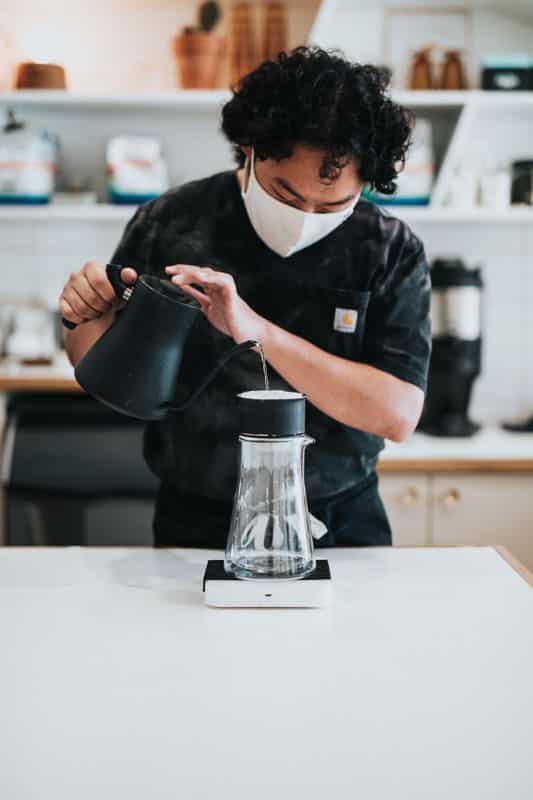 While drinking too much coffee may make you feel sick, you should not be concerned about making you queasy. The caffeine content in coffee stimulates gastric acid secretion. If you want to avoid a nagging stomach pain, drink decaf coffee or increase the amount of fat in your coffee. Drinking only three or four cups of coffee a day is the safest bet. However, if you feel queasy after drinking coffee, you should consult your physician.
While drinking too much coffee may make you feel sick, you should not be concerned about making you queasy. The caffeine content in coffee stimulates gastric acid secretion. If you want to avoid a nagging stomach pain, drink decaf coffee or increase the amount of fat in your coffee. Drinking only three or four cups of coffee a day is the safest bet. However, if you feel queasy after drinking coffee, you should consult your physician.
Acidity of coffee
You probably wonder if drinking coffee can make you feel sick. Although coffee pairs well with breakfast, acidity can irritate your stomach. You might also experience nausea and heartburn if you drink a lot of coffee. If you suffer from this condition, it is best to cut back on coffee consumption or try low-acid, low-altitude varieties. However, if you have to drink coffee, you may want to consult a doctor before starting.
Coffee contains high levels of acid, so consuming it too often can lead to digestive problems. Caffeine can also cause heartburn, acid reflux, and bloating. Coffee acidity varies according to roast and type of brewing. Lighter roasts are generally less acidic than dark roasts. Also, certain varieties are naturally lower in acidity than others. In addition, espresso is higher in acidity than standard coffee.
Coffee contains caffeine, which may cause an upset stomach. If you feel ill after drinking a coffee, it is likely that you have consumed too much or had something with caffeine. If this is the case, drink lots of water or seek medical advice. Caffeine, a stimulant, stimulates the central nervous system. This leads to an increased amount of acid in the stomach and water loss in the body. When you consume a large amount of caffeine, you may have a stomach reaction. You should avoid drinking caffeinated drinks on an empty stomach.
If there are no other methods to reduce coffee’s acidity, you can pinch a small amount of salt in the coffee. Use about a 16th of a teaspoon. If this does not work, try using 1/8 teaspoon. The effect of pinching salt is more pronounced if the coffee is dark-roasted. Experimentation is the only way to find what works best for you. So, keep these methods in mind and try them out.
Caffeine stimulates gastric acid secretion.
The effects of caffeine on gastric acid secretion have been studied in both human and animal gastric mucin secreting cells. They show that caffeine inhibits the action of receptor-IP3 signaling in the secretion of mucin. Thus, caffeine may stimulate gastric acid secretion. These findings suggest that caffeine may act on the site proximal to IP3 production.
However, caffeine’s effect on gastric acid secretion is more complex than previously believed. It is thought that caffeine activates the bitter taste receptors found in the mouth and some extraoral sites. The purpose of these receptors is to regulate GAS secretion. The bitter-masking compound called HED can modify the GAS regulation. This may explain how caffeine causes gastric acid secretion.
Studies have shown that the intragastric instillation of caffeine increases gastric acid secretion. But caffeine-free coffee does not cause any changes in basal serum gastrin concentrations; however, after consuming coffee, acid secretion increases. This effect is attributed to the roasting products in coffee. The caffeine effect is beneficial for people with gastric reflux and peptic ulcer disease.
Researchers injected humans with a methylxanthine substance called caffeine to test whether caffeine stimulates gastric acid secretion. This chemical has been shown to stimulate gastric acid secretion in humans and animals. In one study, caffeine was administered intravenously to patients with duodenal ulcers. Cimetidine also suppressed the secretion of gastric acid.
Other chemical compounds triggering gastric acid secretion include histamine, acetylcholine, and gastrin. The former has the most significant effect on gastric acid secretion. It also stimulates the release of serotonin and GABA. Furthermore, caffeine stimulates gastric acid secretion by acting on mucosal blood vessels and neurotransmitters. It has a positive effect on cardiac function and reduces water loss through urine and stools.
Decaf coffee
The debate over decaf coffee has divided dinner tables for years. While some people swear by the health benefits of caffeine, many others swear by its potential to make you sick. Even though it is still considered healthy, many sources recommend drinking decaf coffee instead of your usual pot of Joe. Here are three reasons why decaf might make you feel sick. The first reason is simple: it contains less caffeine. That means it is a healthier choice overall. Second, decaf doesn’t have caffeine present in regular coffee.
There’s a reason why decaf coffee isn’t as famous as regular coffee. One reason is that it has less caffeine, which some people need. Decaf coffee isn’t made for people sensitive to caffeine and instead targets those who enjoy coffee. It also lacks the immediate energy boost that regular coffee gives you. As such, it’s best to stick to high-quality coffee and decaf coffee.
In addition to making you feel sick, caffeine can interfere with your sleep and irritate your stomach. A sensitive stomach may experience acid reflux. If this happens, switch to decaf coffee, cold brew coffee, iced tea, or other beverages with lower caffeine levels. Lastly, limit the amount of coffee you drink each day. Consuming it after 2 PM can disrupt your sleep cycle and cause headaches.
Decaf coffee is an excellent alternative to regular coffee. It contains the same nutrients as regular coffee but without the side effects. If you are experiencing anxiety, switching to decaf may be the best choice. Even though decaf is cheaper, you should always check the labels of your coffee before drinking it. There are many decaf coffee alternatives, and there’s a good reason why decaf is better for you.
Adding milk or cream to coffee may reduce stomach acidity.
Adding milk or cream to your coffee can ease the discomfort of heartburn. While high-fat milk or creamers may trigger heartburn, they’re also bad for those with lactose intolerance. Sugar and artificial sweeteners also cause belly bloat and inflammation. If you have a history of heartburn, it’s important to identify triggers. Adding milk or cream to your coffee may reduce stomach acidity, but only if you’re sure you’re not lactose intolerant.
Adding milk or cream to your coffee may help reduce stomach acidity, but it’s a delicate balance between health and flavor. If you’re concerned about stomach acidity, milk will neutralize the acids in coffee. If you’re worried about the edge in your coffee, you may want to switch to another beverage. Most cow milk contains the same protein as skim milk, so it’s best to stick with a black coffee.
While adding milk or cream to your coffee may help lower the acidity, there’s no scientific evidence to support this claim. The brewing process creates many acids, including lactose and acetic acid. Drinking too much coffee can aggravate GERD and acid reflux. Experts recommend drinking one or two cups of coffee per day, as these beverages contain antioxidants and minerals that help the digestive tract.
Adding milk or cream to your coffee is also effective in reducing stomach acidity. However, the benefits of adding milk or cream to your coffee are unclear. Although it can add to the euphoric effect of the beverage, the cream and milk do not affect the amount of caffeine in your coffee. Hence, adding milk or cream to coffee may not significantly reduce acidity. For this reason, it is better to use low-fat or no-fat dairy instead.
Symptoms of coffee sensitivity
You may be experiencing some of the symptoms of coffee sensitivity. Your stomach is sensitive to caffeine, the temperature of the coffee, and the things in the coffee. The coffee’s components can cause pain in your chest and belly. This could lead to problems breathing in or out, and you may feel out of breath. In addition to the physical effects, coffee sensitivity can be a source of emotional stress. Here are some symptoms to watch out for.
Some of the more common side effects of coffee consumption are headaches, restlessness, and dizziness. The results of caffeine consumption are different for every person. Coffee sensitivity symptoms can include nausea, heartburn, and vomiting. If you suffer from these symptoms, you should consult a doctor for a proper diagnosis. You may also experience digestive disorders such as acid reflux and heartburn. The symptoms of coffee sensitivity can vary from person to person, so be aware of your symptoms and seek medical advice if you suspect you might have the condition.
Fortunately, coffee sensitivity is not as common as coffee allergies, but it can occur. There is no cure for coffee sensitivity, but it can be treated with medication. The symptoms of coffee sensitivity can be avoided by avoiding coffee altogether. Avoiding coffee entirely is the best way to prevent the signs of coffee sensitivity. Coffee sensitivity is not life-threatening, but it can be not very pleasant. If you experience any of these symptoms, stop drinking coffee until the symptoms subside.
People with caffeine sensitivity will feel its effects much more strongly than others. It can feel like you’ve had multiple espresso shots after a few sips of coffee. In addition, they may experience insomnia, which indicates that caffeine has affected their sleep cycle. If you have any of these symptoms, contact a physician immediately. If you suspect that you might be suffering from coffee sensitivity, consult a physician immediately.




